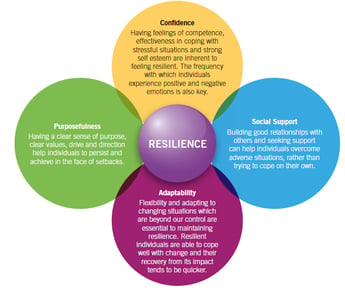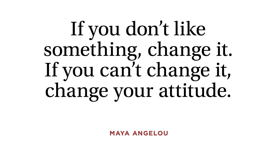Stress - Setbacks - Pressure - Anxiety - Change.
These feelings, experiences are tough - but we can be tougher! How do we handle it all, while becoming better, stronger, and smarter, as a result of the given circumstances? How do we become resilient and bounce back as a better version of ourselves? How do we adapt?
Can resilience and adaptability be cultivated? Absolutely! Let's learn more, remember what we already have inside us, plus discover how to cultivate resilience, adaptability, flexibility, and more.
I. Resilience and Adaptability are Intertwined.
Resilience is a type of strength. It is the psychological strength to withstand adversity and failure. Resilience is mental toughness, or fortitude enabling us to remain undeterred, to weather hardships, and to bounce back, often stronger and more determined than before. Resilience is one of the most important qualities we have to face difficulties and changes in our lives.
As we face our challenges, adaptability allows us to move forward.
Adaptability is adjusting one’s thoughts and behaviors to create a more positive outcome. Adaptability is problem solving. It is managing change (expected or unexpected, good or bad). In other words, it is moving our thoughts from feeling worried to focusing on what’s within our control and creating solutions. 
II. Resilient people remain calm and don’t allow themselves to feel overwhelmed because they:
- Are optimistic and positive – and this optimism keeps them productive (negative thinking is actually counter-productive).
- Keep it all in perspective. It may seem insurmountable now, but looking at the big picture may reveal the issue has less of an overall impact.
- Are hopeful and tap into their belief system – i.e. “All things work together for good.” Often, there will be a positive in what you’re experiencing.
- Seek support, as necessary. By sharing your feelings, talking with someone who’s already been there, or talking with a professional, it is truly helpful.
Those who adapt to a given situation are flexible. They find themselves accepting these disruptors and looking for ways to make improvements.
III. How do you become more flexible? And, change the way you think about change?
 Thoughts are neutral, neither positive nor negative. It’s the feelings attached to a thought that lead to discomfort, anxiety, and doubt. You can generate thoughts and feelings that serve you best.
Thoughts are neutral, neither positive nor negative. It’s the feelings attached to a thought that lead to discomfort, anxiety, and doubt. You can generate thoughts and feelings that serve you best.
Maya Angelou summed it up, “If you don't like something, change it. If you can't change it, change your attitude.”
Adjust your thoughts, perspective, and attitude, plus prepare for change to happen and prepare how you’ll respond.
IV. The Solution(s) - People who adapt easily use these tactics and:
- Intentionally think positively – thoughts that serve you best lead to increased confidence, belief in yourself and your abilities.
- Challenge negative thoughts – negative thoughts create indecision, inactivity, doubt, and fear, which makes accepting change more difficult. Question whether a negative thought is actually true.
- Look for solutions rather than staying focused on the problem.
- Focus on what’s within their control – identify what you can do, and do it.
- Pivot while remaining focused on priorities, values, and vision – multiple paths lead toward a goal.
- Enjoy a growth mindset - be curious, willing to evolve, open to new possibilities and opportunities.
- View the discomfort of change as fun, a challenge, or a problem to solve - turn it into an advantage.
- Accept change – the sooner you accept it, learn from it, and move forward, the happier you’ll be. I promise, as resisting change only makes it tougher on you.
Engineer your own bounce-back. Hype yourself up! Since we believe our thoughts to be facts, you can decide and then declare to get through it better and stronger with:
- Positive self-talk – it builds resilience and confidence. What you tell yourself is everything!
- Remove negative self-talk – it leads to frustration, anxiety, doubt, and fear, which hurts you rather than helps you and limits your bounce-back.
- Remember past successes – they remind you of your abilities and are encouraging that you can handle whatever happens. You got this!
- Celebrate wins as they occur – it truly underscores your competency.
Change is constant. One of the greatest moves you can do across all aspects of your life is learn to be resilient, flexible, and adapt. Say ‘yes’ to change. You’ll not only be happier, but you’ll also impact those around you in many positive ways. Again, while we aren't always able to control what happens, we are able to take control of our reaction(s), our attitude, and come out on top again.
###
Lori Hough is a Certified Life Coach, Relationship Coach & LifeGuide
As a LifeGuide, Lori's expertise includes: Self-Esteem, Self-Image; Thriving Relationships; Embracing Change; Healthy Habits Planning; Overcoming Fear; Resilience & Adaptability.



